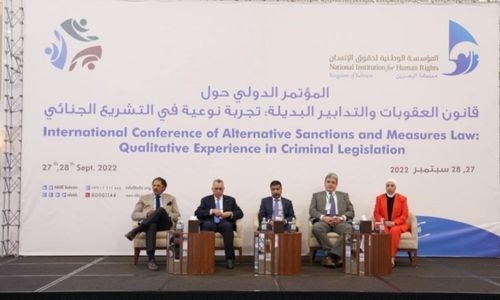Bahrain’s alternative penal code praised
TDT | Manama
The Daily Tribune – www.newsofbahrain.com
Bahrain’s successful adoption of the alternative penal code is an important practice to be emulated at the level of Arab countries and the countries of the region. This was according to keynote speakers at the conclusion of the International Conference of Alternative Sanctions and Measures Law: Qualitative Experience in Criminal Legislation” yesterday. National Institute of Human Rights (NIHR) Chairman Ali Al Derazi noted that more than 4,000 people have benefited from the law since its adoption four years ago.
He looked forward to adopting a new mechanism to expand the number of beneficiaries of alternative punishments, noting that NIHR has developed a plan to involve the private sector in the implementation of alternative punishments. Egypt-based Arab Human Rights Organisation President Dr Alaa Sayyed Shalabi pointed out that there are lessons learned from Bahrain’s practices. Important recommendations were made by the speakers in the conference sessions, stressing the significance of having a political will that believes in legal modernisation.
Dr Hatem Ali, Deputy Secretary-General of the United Nations and Executive Director of the UN Office on Drugs and Crime, said that Bahrain had taken the initiative in adopting an independent law related to alternative punishments. He described the law as being easier, more effective and appropriate for society, noting the active role of the conference in transferring the practice to the regional and international community. In response to the idea that work should be paid, Judge Badr Al Abdullah pointed out that work under the alternative system replaces the original punishment.
“The law stipulates that work be performed in the service of society is a description that does not fall within the usual work systems,” he said, noting the existence of an international standard in determining time and hours according to cases and their circumstances.
Related Posts

